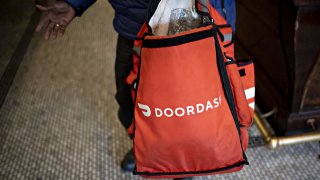
- DoorDash, already benefitting from food delivery trends, is getting into alcohol delivery.
- The food delivery service announced Monday it's adding alcohol to its marketplace across 20 states, the District of Columbia, Canada and Australia.
- The move will also pit DoorDash further against its delivery competitor Uber.
DoorDash said Monday customers can now buy alcohol directly through its app.
The effort will grow the company's reach and could drive people to use its app more often since they'll be able to order drinks directly from DoorDash. The company said the addition of alcohol delivery could increase restaurants' average order values by 30%.
Get Tri-state area news and weather forecasts to your inbox. Sign up for NBC New York newsletters.
"Alcohol really presents a win, win, win for all of our audiences," CEO Tony Xu said on CNBC's "TechCheck." Along with larger app orders, restaurants can sell more and gig workers can earn more, he added.
Alcohol will be available through the DoroDash app in 20 states, the District of Columbia, Canada and Australia, reaching more than 100 million customers worldwide, DoorDash said. The company didn't immediately specify what states will allow the option.
Customers of drinking age can toggle the alcohol tab on the DoorDash app to order beer, wine and spirits from a selection of restaurants, grocery stores, convenience stores and local retailers. The company said it will check the buyer's ID in the app and during delivery.
Money Report
Prior to Monday's announcement, national and local merchants could offer alcohol through DoorDash's white-label fulfillment service, DoorDash Drive, where gig workers deliver orders directly from merchants.
The move will pit DoorDash further against its delivery competitor Uber. What is traditionally thought of as a rideshare app, Uber has spent the pandemic strengthening its Uber Eats business. It acquired alcohol delivery start-up Drizly earlier this year for $1.1 billion.
DoorDash, which went public in December, has benefitted from food delivery trends over the past year. The company's stock began trading at $182 per share on Dec. 9, 2020, and closed at $223 on Friday, up about 22.5%. Its market cap is about $74.9 billion, just below Uber's $75.3 billion valuation.






